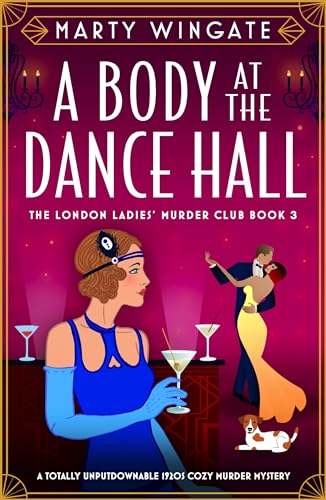 A Body at the Dance Hall (London Ladies' Murder Club #3) by Marty Wingate
A Body at the Dance Hall (London Ladies' Murder Club #3) by Marty Wingate Format: eARC
Source: supplied by publisher via NetGalley
Formats available: paperback, ebook, audiobook
Genres: cozy mystery, historical mystery
Series: London Ladies' Murder Club #3
Pages: 304
Published by Bookouture on April 8, 2024
Purchasing Info: Author's Website, Publisher's Website, Amazon, Barnes & Noble, Bookshop.org
Goodreads
1922. Amateur sleuth Mabel Canning is surrounded by the bright lights of London as she chaperones a young American woman to a dance. But when someone is murdered, a deadly tango begins…Meet plucky woman-about-town Mabel Canning, leader of the London Ladies’ Murder Club and trusted assistant to gentlewomen. When she is tasked with accompanying Roxy, a fun-loving heiress, on a glamorous night out, Mabel can’t wait to sip champagne and practice the foxtrot. But just as Roxy sashays out of sight, a mysterious man warns Mabel that the feisty young redhead is in danger. And someone is dead before the music stops...Roxy was the last person to see the victim alive, and she stumbles into Mabel’s arms with her daffodil-yellow dress splashed with blood. Determined to protect her ward, Mabel gathers her dashing beau Winstone and her pals from the murder club. Together they trace the weapon back to the ballroom, but when its twin goes missing, it is clear time is running out to prevent another murder on the dance floor…The police conclude the killer is in Roxy’s family, but Mabel finds herself spinning between a motley troupe of suspects. Mr Bryars, the anxious ballroom manager, is constantly tripping over himself to hide his secrets. But would he kill to protect his reputation? And young Ned Kettle may have looked dashing while waltzing around with Roxy, but he was once a notorious thief. Is the sticky-fingered rogue also a dab hand at murder?Just as Mabel and her murder club friends quickstep closer to the truth, Roxy is kidnapped, and Mabel comes cheek to cheek with the killer. Can she save poor Roxy and herself? Or has she danced her last dance?A delightfully witty and utterly addictive whodunnit absolutely bursting with 1920s sparkle, from USA Today bestselling author Marty Wingate. Perfect for fans of Agatha Christie, Richard Osman, Verity Bright and T.E. Kinsey.
My Review:
As a member of Miss Kerr’s Useful Women Agency, Mabel Canning has taken on all kinds of jobs and been useful to many different people, from helping someone decide on wallpaper to delivering packages to making sure that certain young scamps really do board their trains back to school.
It’s not at all outside the bounds of the services offered by the Useful Women Agency for Mabel to accompany a young American woman on outings and excursions, to be her tour guide while keeping an eye on her, and doing her best to keep Roxanne Arkwright out of trouble.
 But trouble finds Mabel, as it has in her previous adventures, A Body on the Doorstep and A Body at the Séance, in the form of, well, a dead body – this time on the floor of the Hammersmith Palais de Danse.
But trouble finds Mabel, as it has in her previous adventures, A Body on the Doorstep and A Body at the Séance, in the form of, well, a dead body – this time on the floor of the Hammersmith Palais de Danse.
(Yes, it’s a new face on the ballroom floor, which is how I always heard the phrase, “new face on the BARroom floor” as a child. I’m both tickled at the reference and chagrined at how long it took me to figure it out – albeit not THIS long.)
Scotland Yard, in the person of Detective Inspector Tollerton isn’t nearly as surprised as he’d like to be to discover Mabel on the scene of yet another murder – but Mabel has been useful to Scotland Yard in two previous cases, so Tollerton seems to have reached a position of tolerance, at least, on the subject of Mabel and her penchant for being on the scene when a body drops at someone’s feet – whether those feet are her own or not.
At least this time around Mabel can’t possibly be a suspect, as she was locked in the Palais’ larder at the time. And neither can her charge, Roxanne Arkwright, be in this particular frame. Although Roxanne’s father certainly could be. And briefly is as the case unfolds.
That the murder victim, Oswald Deuchar, was a private investigator in the employ of Roxanne’s father, Rupert Arkwright, for the purpose of watching over Roxanne – along with Mabel but without her knowledge – adds both to the confusion and to the potential motives for his death. After all, private investigators, even ones as quirky and eccentric as Deuchar often accumulate enemies.
Unless the poor man’s death wasn’t about Oswald the investigator and protector, but instead had everything to do with his protectee – and Mabel’s – Roxanne Arkwright.
 Escape Rating A-: I’ve already reached the point in Mabel’s adventures where I’m here specifically for her, and the particular case she’s working on is just extra. A compelling extra in the case of A Body at the Dance Hall, but still extra. I’m here to see how Mabel and her friends are doing, and to watch as she learns more about London, her assigned jobs for the Useful Women Agency, and the progress of her romance with her neighbor, Park Winstone. I’m especially here for the way that she keeps learning how to be a good investigator as well as an independent woman, a good worker and a good friend.
Escape Rating A-: I’ve already reached the point in Mabel’s adventures where I’m here specifically for her, and the particular case she’s working on is just extra. A compelling extra in the case of A Body at the Dance Hall, but still extra. I’m here to see how Mabel and her friends are doing, and to watch as she learns more about London, her assigned jobs for the Useful Women Agency, and the progress of her romance with her neighbor, Park Winstone. I’m especially here for the way that she keeps learning how to be a good investigator as well as an independent woman, a good worker and a good friend.
What I really like about Mabel and her adventures is that Mabel comes into the story both by agency and with agency and that it doesn’t feel anachronistic that she does.
In the first book in the series, A Body on the Doorstep, Mabel comes to London from the tiny village of Peasmarsh. She’s in her early 30s, never married, and has always dreamed of being on her own. She loves her father dearly, but Peasmarsh is a small, insular town and she’s not ready to settle into the plans it has for her.
Mabel’s comes to London after both the Great War and the Spanish Flu epidemic. An entire generation of young British men died in the trenches, to the point where Mabel is one of many women who may have to make their own ways in the world because of those losses. The idea that she might be on her own, that her father may worry about her – he does – that the doorman at her building looks out for her on his behalf and sends back reports – which he does – does not mean that Mabel isn’t completely independent. It just means that he loves her and wants to know someone is looking out for her, but even that doorman abides by the principle that what her dad doesn’t know won’t hurt anyone. No one is supporting Mabel except herself and she answers to no one except Miss Kerr at the Useful Women Agency.
Mabel’s life is a far cry – and a delightful one – from women in quite a lot of historical mysteries (including the one I bailed on last week in a rage). Mabel’s world isn’t fair to women – the world STILL isn’t – but her times and her circumstances allow her to be in a position to answer to herself alone and not be forced to kowtow to the men in her life for every second of her existence. Which was a true experience but isn’t any fun to read and too many female-fronted historical mysteries spend the first third of the book if not more showing all the ways that the world forces them to conform and how they, in turn, are forced to work around all those restrictions.
This series is a breath of fresh air because Mabel doesn’t have to do all of that heavy lifting just to be about her business. And I’m so very happy that is so and honestly relieved to start another of her cases.
And I’ll get down from my soapbox now.
The thing about this particular case is that both Roxanne and the villain have daddy issues. Their fathers have been missing from their lives from about the same age – but the reasons for their absence are quite different, and the results, well, the results are about as diametrically opposed as they could get – very few of which have to do with their positions at nearly opposite ends of the socioeconomic ladder.
Because I don’t want to get into spoiler territory, let’s talk about Roxanne’s issues because, well, her issues have issues and not a one of them is her fault. Her parents are divorced, her mother left England for America eight years ago, when Roxy was just ten years old. And her mother has been gaslighting her ever since about pretty much everything to do with her father, to the point of outright parental alienation so severe as to constitute emotional abuse while demonstrating EXACTLY why parental alienation is considered emotional abuse at the same time. Roxanne comes to London expecting to find a monster, only to discover a father who loves her very much and has missed her terribly, and a stepmother who can help Roxy heal from her mother’s treatment and build up faith in herself and her own judgment – because that’s exactly what her own mother has been tearing down all these years.
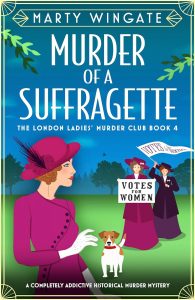 All of which means that in the middle of her assignment to show Roxanne the sights of London, Mabel also has a ringside seat on the behavior of Roxy, her father and stepmother, her mother when she arrives from America very much like the avatar of DOOM in T. Kingfisher’s A Sorceress Comes to Call – albeit one without any actual magic but plenty of the same malice.
All of which means that in the middle of her assignment to show Roxanne the sights of London, Mabel also has a ringside seat on the behavior of Roxy, her father and stepmother, her mother when she arrives from America very much like the avatar of DOOM in T. Kingfisher’s A Sorceress Comes to Call – albeit one without any actual magic but plenty of the same malice.
The closer Mabel gets to Roxy, the more she treats her as a bit of a ‘little sister’, the much harder it is to detach herself as the plot closes in and traps Roxy in its jaws. From that point, it’s a race to the finish, to save the young woman from an enemy that no one saw coming because there was so much enmity already floating around.
I had a ball with A Body at the Dance Hall, so I’m thrilled to say that there is a FOURTH book coming in December, Murder of a Suffragette. I’m already looking forward to it.
~~~~~~ GIVEAWAY ~~~~~~
Because I really enjoy Mabel’s adventures, as I did the author’s Birds of a Feather and Potting Shed series, I chose this book for my Blogo-Birthday Celebration Week, so that I could share that enjoyment with the lucky winner of today’s giveaway.
On this second day of my Blogo-Birthday Celebration, today’s giveaway is the winner’s choice of ANY one of Marty Wingate’s books, in any format, up to $20 (US).
Good luck with today’s giveaway and remember that there’s more to come!
a Rafflecopter giveaway


 The Emperor and the Endless Palace by
The Emperor and the Endless Palace by  What You Are Looking For Is in the Library by
What You Are Looking For Is in the Library by  As much as I enjoyed the narration, which I very much did, it’s the stories themselves that give the collection its charm, as was true in similar books such as
As much as I enjoyed the narration, which I very much did, it’s the stories themselves that give the collection its charm, as was true in similar books such as  The Graveyard of the Hesperides (Flavia Albia Mystery, #4) by
The Graveyard of the Hesperides (Flavia Albia Mystery, #4) by 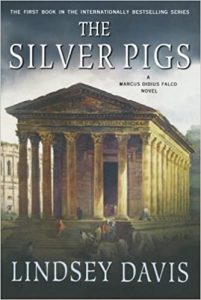 No matter how much technology advances, human nature remains pretty much the same, and that’s a big part of what makes historical mysteries so much fun AND so absorbing. That’s especially true in the
No matter how much technology advances, human nature remains pretty much the same, and that’s a big part of what makes historical mysteries so much fun AND so absorbing. That’s especially true in the 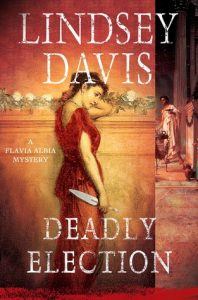 In other words, I came into this book with a whole lot of nostalgia and more than a bit of mystery reading background and baggage crowding my thoughts and falling out a bit willy-nilly all over the place. After all, it’s been nearly two years since I last visited Flavia Albia and her family in
In other words, I came into this book with a whole lot of nostalgia and more than a bit of mystery reading background and baggage crowding my thoughts and falling out a bit willy-nilly all over the place. After all, it’s been nearly two years since I last visited Flavia Albia and her family in  Even as she is in the midst of her own wedding and the hope of future happiness that it brings. If she can just manage to solve this case and get her in-laws out of her own and her formidable mother’s hair before someone’s face gets shoved into fist. Quite possibly her father’s.
Even as she is in the midst of her own wedding and the hope of future happiness that it brings. If she can just manage to solve this case and get her in-laws out of her own and her formidable mother’s hair before someone’s face gets shoved into fist. Quite possibly her father’s. The Mystery Writer by
The Mystery Writer by  Escape Rating B-: I picked this up because I LOVED the author’s previous book,
Escape Rating B-: I picked this up because I LOVED the author’s previous book, 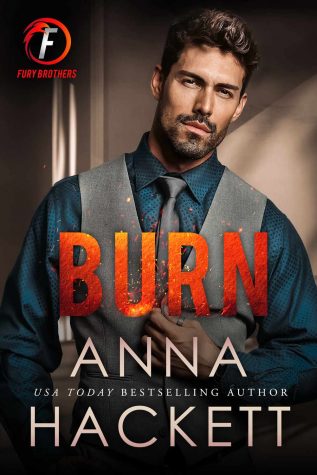 Burn (Fury Brothers #3) by
Burn (Fury Brothers #3) by  As this third entry in the
As this third entry in the  Like the first two books,
Like the first two books, 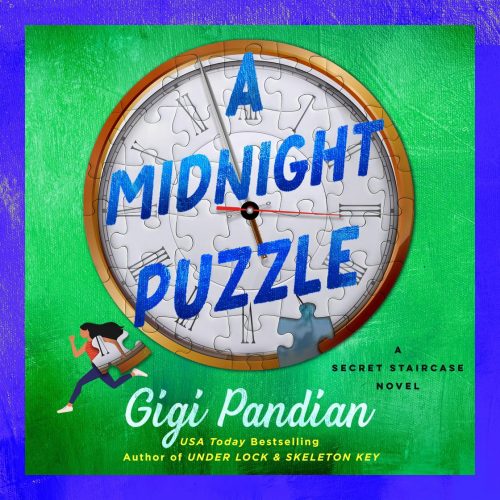 A Midnight Puzzle (Secret Staircase Mystery, #3) by
A Midnight Puzzle (Secret Staircase Mystery, #3) by 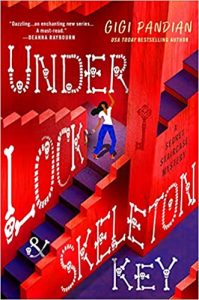 After her adventures – and misadventures – in the first two books in the
After her adventures – and misadventures – in the first two books in the 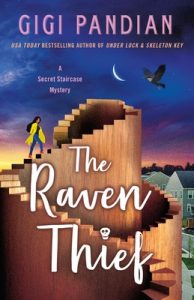 Escape Rating B: I have to admit that I went into this third entry in the series with a bit of trepidation after the muddle of
Escape Rating B: I have to admit that I went into this third entry in the series with a bit of trepidation after the muddle of 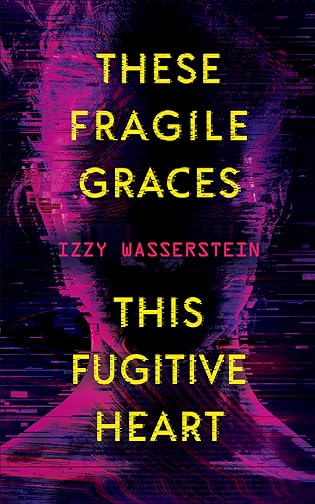 These Fragile Graces, This Fugitive Heart by
These Fragile Graces, This Fugitive Heart by 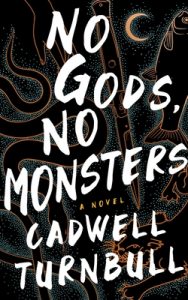 I also would have loved a bit more about the anarchist and commune movement as it applied to this particular story, because I was basing all of my knowledge and acceptance of the way that part of their world worked on Cadwell Turnbull’s fantastic
I also would have loved a bit more about the anarchist and commune movement as it applied to this particular story, because I was basing all of my knowledge and acceptance of the way that part of their world worked on Cadwell Turnbull’s fantastic 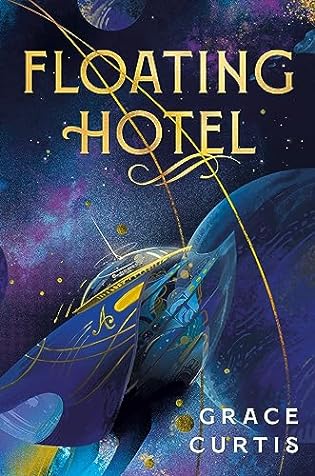 Floating Hotel by
Floating Hotel by  The Fox Wife by
The Fox Wife by